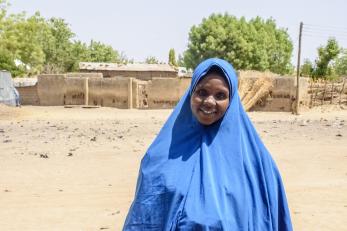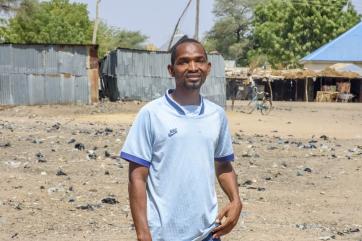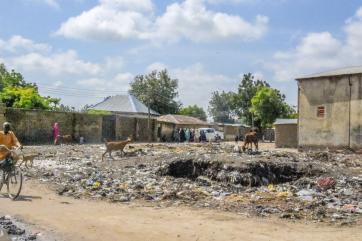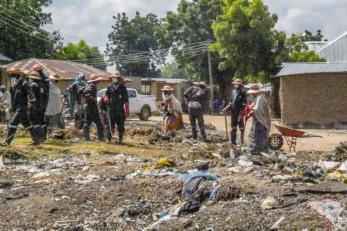Cleaning up Alkalari: Turning a dumpsite to a model for clean living

Yagana Usman, a 35-year-old mother of seven is one of the few people who were born, grew up in and settled in Alkalari ward of Damboa Local Government Area, Borno State. In the past three decades, she has witnessed contrasting eras, and was reduced to the role of a helpless observer as her world became polluted and marked with stench. While she has memories of playing freely on the streets as a child, she now faces the reality that the street has become a massive dumpsite, constantly emitting a terrible odor.
It is also a haven for germs and diseases, making it unsafe for her children to play. As a mother, the weight of this burden was heavy on Yagana's heart. This was not the life she envisioned for her children—a life filled with the stench of refuse and haunted by the fear of disease. Alkalari, like most communities in northeast Nigeria, suffers from the aftermath of the Boko Haram insurgency and climate change. In addition, residents of the ward have an additional threat that predates the insurgency: a refuse dump.


Alkalari has become known as a refuse dump in Damboa, with the huge dumpsite greeting anyone entering the community. “This refuse dump was not here when I was a little girl,” Yagana said. “It started like a joke when people started dumping refuse here, and 20 years down the line, people from other communities have turned this place into their refuse dump. The road is completely blocked, and people cannot pass, especially at night,” she continued.
To illustrate the size of the dumpsite, Mamman Mohammed, another resident, said, “When two adults stand at opposite ends of the refuse dump, it is so high they won’t see each other.”
The refuse dump constituted an eyesore to the ward, but worse than that was the health hazard it posed to the residents, especially children. “I am never at ease when the children go out. I am worried they will climb the refuse dump to play and pick things, and there are broken bottles and nails there. People even throw diapers with feces there,” Yagana lamented. “The children fall sick often,” Mamman said. “We have had cases of tetanus and skin diseases breakout here. In fact, there are evil spirits on the dump that possess the children when they go there,” Mamman continued. During the rainy season, when the place gets flooded, water moves dirt from the refuse dump into houses.
Members of the community had on several occasions tried to find a solution to the problem, but all proved abortive. They petitioned both traditional and civil leaders, but to no avail. Determined to find a solution, they approached Mercy Corps, which has had a presence in Damboa for over 10 years, after hearing about its sanitation brigade’s work in another community.
The sanitation brigade of Mercy Corps’ Broadening Emergency and Graduation Efforts (BEGE) program, funded by USAID, commenced work on the dumpsite in Damboa. This activity took over 6 months to complete.

“I was ecstatic when I saw them clearing out the refuse dump, and I often supported the workers with water to drink,” Mamman shared. The BEGE program has brought a huge relief to residents of the ward and Yagana’s testimony encapsulates this, “Seeing my children play here without worry brings memories of when I used to play here too, and this gladdens my heart.”
To ensure a sustainable solution, Mercy Corps collaborated with the community to establish a designated waste disposal site behind the GSS IDP camp, approximately 500 meters away. The local government also restricted refuse dumping at the site and imposed fines on anyone who does so in the future. This designated site, coupled with the new fines, aims to prevent the reemergence of the previous health hazard.
Residents of Alkalari now enjoy a clean and healthy environment, making the community a model for clean living. This transformation is proof that deliberate collaborative efforts can make a significant difference in communities.
About BEGE
BEGE is a Hausa word for “hope.” The program aims at securing progress in improving human security outcomes in central and southern Borno following 13 years of conflict. BEGE-Borno is a 24-month program funded by USAID’s Bureau for Humanitarian Assistance that aims to save and sustain lives and enhance the adaptation of internally displaced persons and vulnerable host communities to shocks and systemic constraints within Borno State. BEGE works in selected wards in Damboa, Dikwa, Gwoza, Konduga, and Monguno Local Government Areas of Borno State. The program is implemented by Mercy Corps in consortium with the International Rescue Committee (IRC) and has interventions in agriculture, health, nutrition, food assistance, WASH, protection, MPCA, shelter, and settlement.